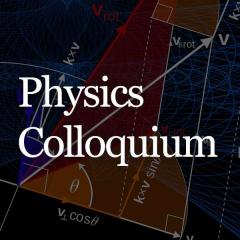Searching for Dark Matter Scattering, on Earth and in the Stars
Speaker: Professor Nicole Bell
Affiliation: University of Melbourne
Abstract
The quest to identify the cosmological dark matter is one of the foremost goals of science today. Yet the very nature of dark matter makes this a formidable task. l outline the status of dark matter direct detection searches and describe new strategies to probe light dark matter scattering using existing detectors, such as the Migdal effect. Complementary information about dark matter scattering can be obtained by considering the capture of dark matter in stars. In this scenario, collisions of ambient dark matter particles with stellar matter can result in sufficient energy loss for the dark matter to become gravitationally bound to the star. I describe applications of dark matter capture in the Sun, white dwarfs and neutron stars, to probe interactions that would be difficult or impossible to observe in experiments on Earth.
About Physics colloquium
The Physics Colloquium series hosts a range of speakers from Australia and abroad. The series explores a variety of topics and everyone is welcome to come along. The seminars are open so there is no need to register your attendance.
If you would like to sign up for colloquium announcement emails, you can join the mailing list by sending a blank email to:
- For UQ email addresses: physics-colloquium-others-join@lists.science.uq.edu.au
- For non-UQ email addresses: physics-announce-external-join@lists.science.uq.edu.au
(Note: if you receive physics-all emails, you should already receive these and don't need to sign up again).
Venue
Room: 216 (and via Zoom:
https://uqz.zoom.us/j/82590260715)

